
Fletcher Place is a historic district and neighborhood in the city of Indianapolis, Indiana named after Calvin Fletcher, a prominent local banker, farmer and state senator.
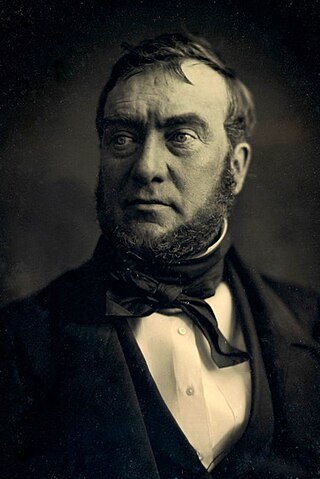
Joshua Bates was an American international financier who divided his life between the United States and the United Kingdom.

The Pierce House is a rare 17th-century house at 24 Oakton Avenue in the Dorchester neighborhood in Boston, Massachusetts. Built c. 1683, It documents period building practices, and the tastes and housing needs of one family, the Pierces, over more than three centuries. At different times, family members expanded and adapted their dwelling to meet new demands for space, function, comfort, privacy, and cleanliness.

Wakefield station is an MBTA Commuter Rail station in Wakefield, Massachusetts served by the Haverhill Line. The station has two side platforms, which are not accessible, serving the line's two tracks. The station building, constructed in 1889, was listed on the National Register of Historic Places in 1989 as Wakefield Upper Depot.
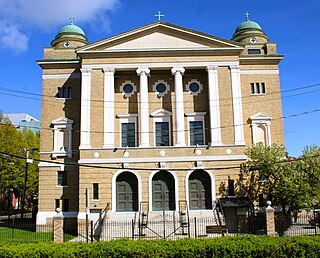
The Annunciation Greek Orthodox Cathedral of New England is a historic Greek Orthodox church in Boston, Massachusetts that was added to the National Register of Historic Places as Greek Orthodox Cathedral of New England in 1988.

The Bigelow School is a historic school at 350 West 4th Street in South Boston, Massachusetts. The three-story Classical Revival brick building was designed by Charles J. Bateman and built in 1901. Features include corner quoining, cast concrete window lintels and sills. It was named for John P. Bigelow, mayor of Boston when the first school was built on the site in 1850. It was closed by 1976.

The Bowditch School is an historic school building at 80–82 Green Street in the Jamaica Plain neighborhood of Boston, Massachusetts. The three-story brick-and-granite Classical Revival building was designed by Harrison Henry Atwood, a prominent local architect, and was built in 1892. Its main facade has a projecting three-part pavilion, with square entry openings at the base, and round-arch windows at the top level, with a modillioned cornice. It is named for Nathaniel Bowditch, a noted early 19th-century astronomer and mathematician.

The Codman Square District is a historic district in the Dorchester neighborhood of Boston, Massachusetts. It consists of four of the most prominent properties facing the main Codman Square intersection, where Talbot Avenue and Washington Street cross. The area has a long history as a major civic center in Dorchester, and is now one of the large neighborhood's major commercial hubs. The properties in the district include the 1806 Congregational Church, the 1904 Codman Square branch of the Boston Public Library, the former Girls Latin Academy building, and the Lithgow Building, a commercial brick structure at the southeast corner of the junction that was built in 1899.

The Congress Street Fire Station, now known as the Boston Fire Museum, is an historic fire station at 344 Congress Street in Boston, Massachusetts.
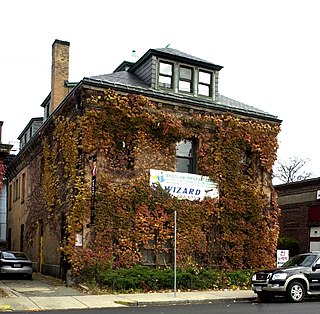
The Harvard Avenue Fire Station is a historic former fire station on 16 Harvard Avenue in Boston, Massachusetts. The station was designed in 1891 by Harrison H. Atwood, the Boston city architect who also designed the Congress Street Fire Station, It is a hip-roofed two story brick structure with Renaissance and Classical Revival elements. It was the second firehouse built on the site, and housed Engine #41 and Hook and Ladder #14.

The Harvard Avenue Historic District is a historic district roughly bounded by Linden Street, Commonwealth Avenue, Harvard Avenue, and Park Vale Avenue in the Allston neighborhood of Boston, Massachusetts. Its spine is Harvard Avenue, a major north–south thoroughfare connecting Allston to points north, and south toward Brookline. The area underwent a population explosion in the early 20th century, and Harvard Avenue was developed roughly between 1905 and 1925 as a commercial and residential spine. Notable buildings in the district include the Allston Station building, designed by Shepley, Rutan and Coolidge, and the Harvard Avenue Fire Station.

The Massachusetts School of Art is an historic academic building at 364 Brookline Avenue in the Longwood Medical Area of Boston, Massachusetts. The four-story Gothic/Art Deco building was designed by the architectural firm of Henry & Richmond, and was built in 1929-30 for the Massachusetts College of Art. The school occupied the building until 1983, when it moved to its present campus on Huntington Avenue. The building is now part of the Beth Israel Deaconess Medical Center.
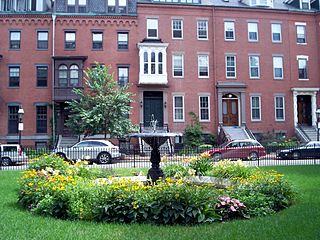
The South End District is a historic district encompassing a portion of the South End neighborhood of Boston, Massachusetts. It is bounded roughly by the Southwest Corridor Park on the northwest, the Massachusetts Turnpike to the north, Herald Street to the east, AlbanyStreet to the south east, and Massachusetts Avenue to the southwest. The area's principal development took place 1850–73, and resulted in a neighborhood of what were originally single-family brick or brownstone rowhouses, interspersed with retail and civic buildings, as well as six small parks. After the Panic of 1873 these properties were for the most part converted to multi-unit housing.

The Sumner Hill Historic District encompasses a predominantly residential area of high-quality late 19th-century residences in the Jamaica Plain neighborhood of Boston, Massachusetts. It is roughly bounded by Seaverns Avenue, Everett Street, Carolina Avenue, and Newbern Street just east of the neighborhoods commercial Centre Street area. The district features Second Empire, Italianate, and Queen Anne style architecture, and was listed on the National Register of Historic Places in 1987.

The Shell Oil Company "Spectacular" Sign is a historic advertising sign by the Shell Oil Company located at 187 Magazine Street in Cambridge, Massachusetts.

The former First Unitarian Church is a historic church building at 130 Highland Avenue in Somerville, Massachusetts. The stone church was built in 1894 for a Unitarian congregation. It was designed by Hartwell & Richardson and is a good example of Richardsonian Romanesque design. The building presently (2022) houses the Mission Church of Our Lord Jesus Christ.

The Walnut Street School is a historic school building at 55 Hopkins Street in Reading, Massachusetts. A two-room schoolhouse built in 1854, it is the town's oldest public building. Since 1962 it has been home to the Quannapowitt Players, a local theatrical company. The building was listed on the National Register of Historic Places in 1984.
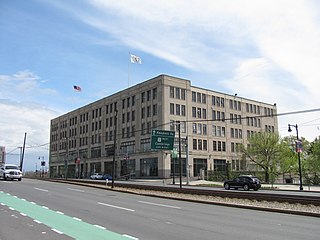
The Peter Fuller Building is a historic commercial building located at 808 Commonwealth Avenue in Brookline, Massachusetts.

Hartwell & Swasey was a short-lived 19th-century architectural firm in Boston, Massachusetts. The partnership between Henry Walker Hartwell (1833-1919) and Albert E. Swasey, Jr. lasted from the late-1860s to 1877, when Swasey went on his own. In 1881, Hartwell formed a partnership with William Cummings Richardson – Hartwell and Richardson – that lasted until his death.

Louis Weissbein (1831–1913) was a German-born American architect practicing in Boston, Massachusetts.
























